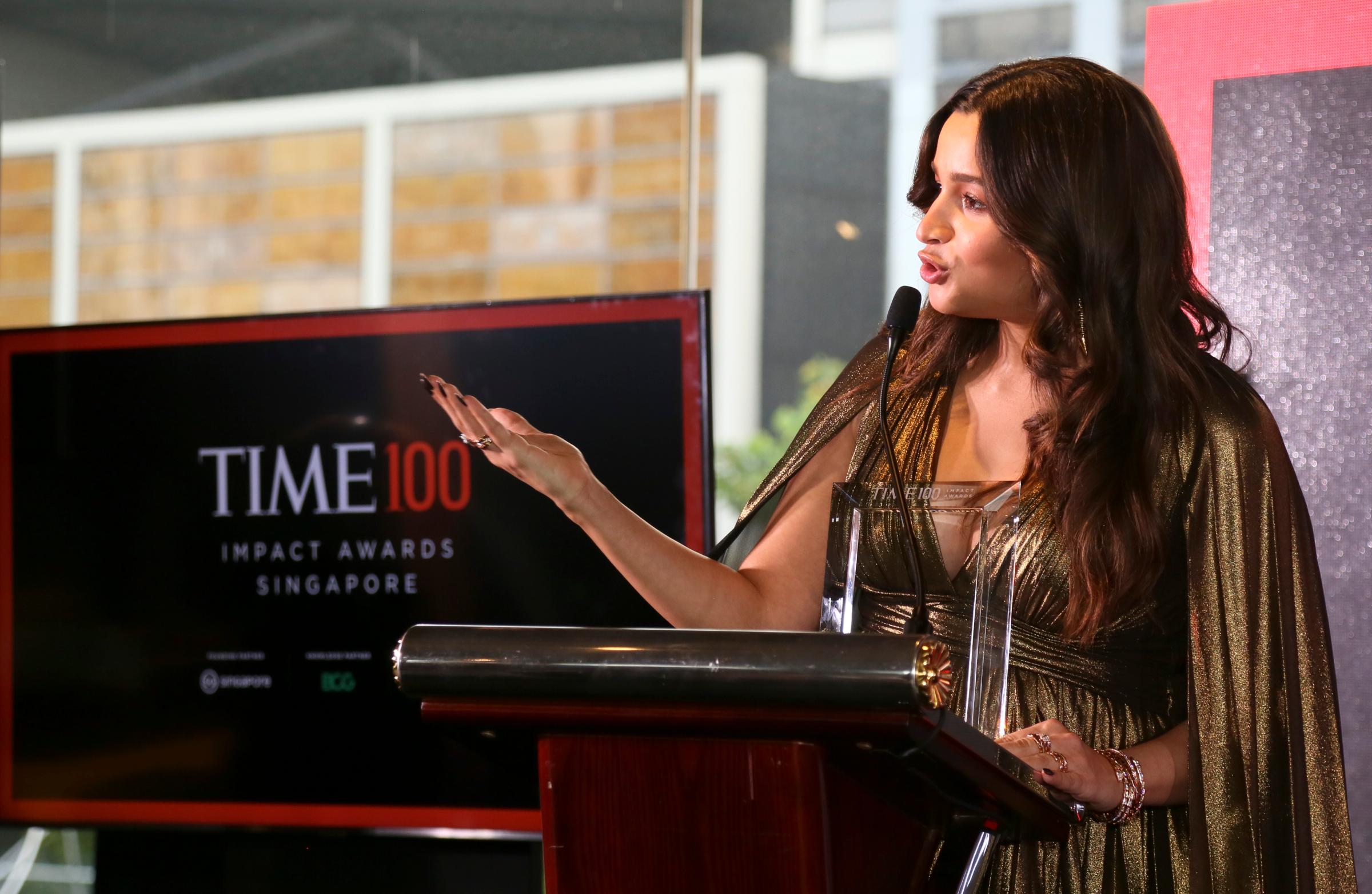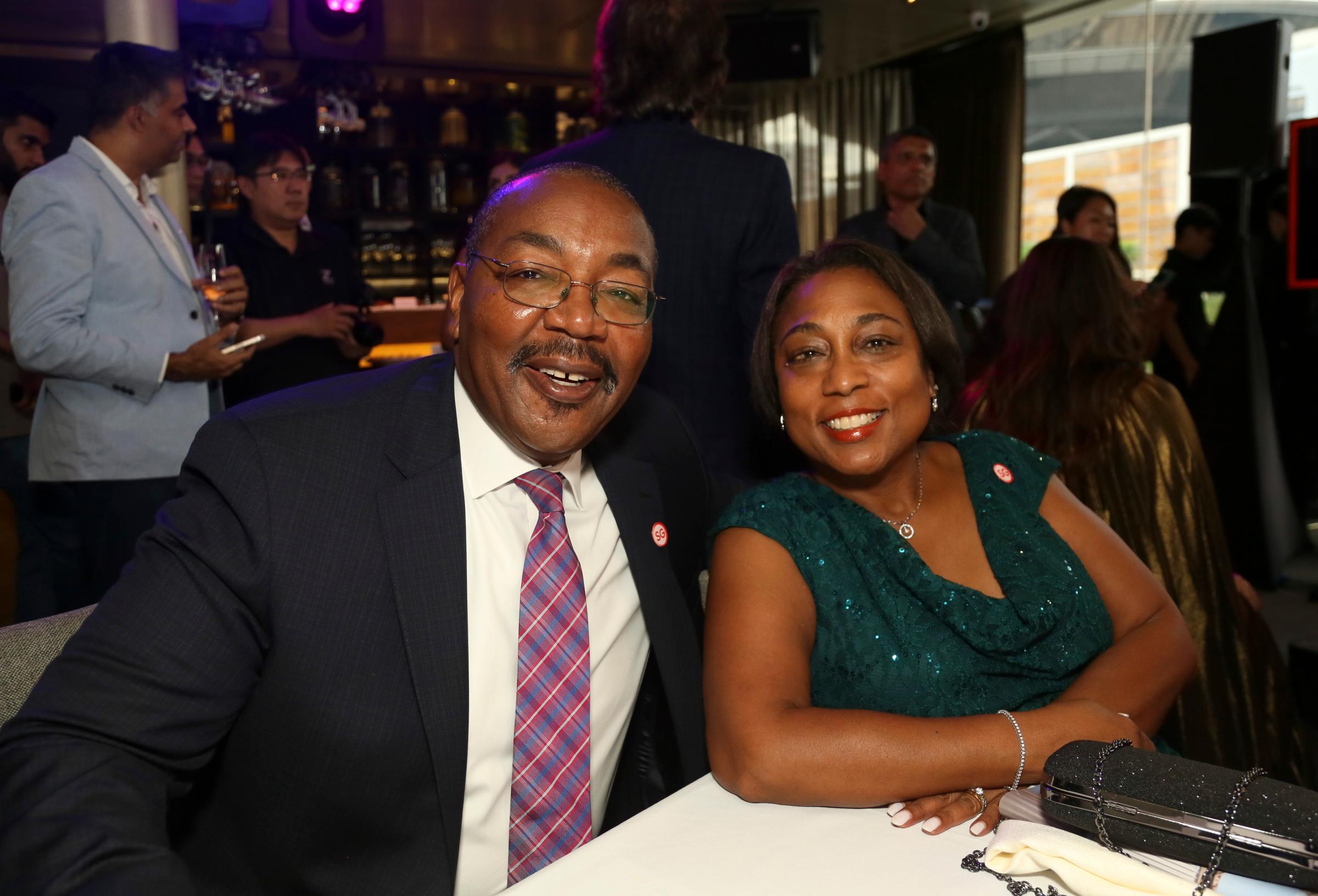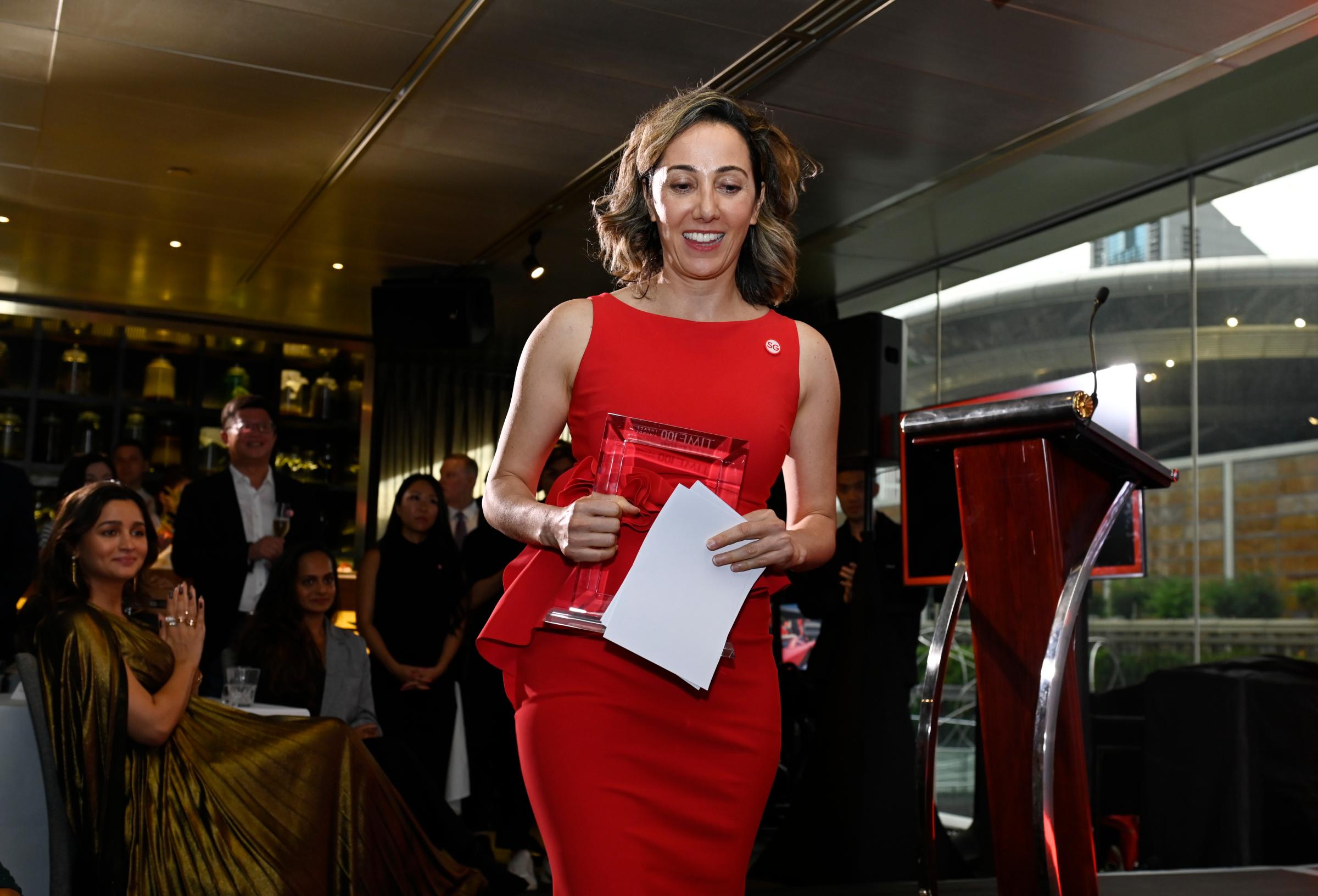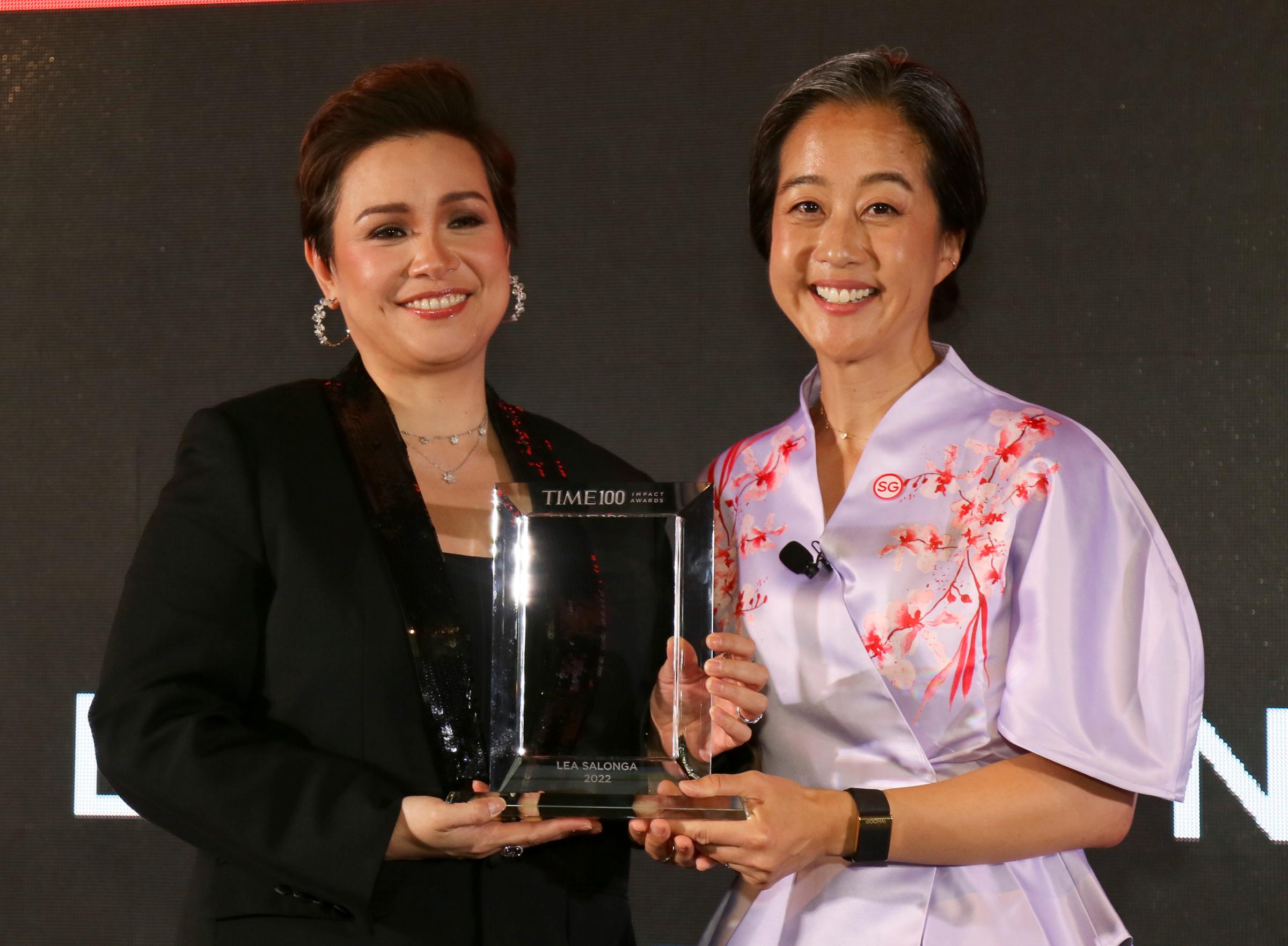About 400 guests gathered atop the National Gallery Singapore on Sunday for the latest TIME100 Impact Awards.
The newest recipients of TIME100 Impact Awards—which recognize leaders who have done extraordinary work to shape their fields and the world at large—are actor and producer Alia Bhatt, the former James Webb Space Telescope Program Director Gregory L. Robinson, computational geneticist Dr. Pardis Sabeti, and singer and actor Lea Salonga.
“These scientists, entertainers, storytellers, and changemakers are moving all of us forward, one extraordinary action at a time,” said TIME’s Chief People Officer Sue Suh. The event is the first TIME100 Impact Awards presented in the Asia-Pacific region.
The awardees delivered wide-ranging acceptance speeches, spanning the power of collaboration, to the protests in Iran.
The TIME100 Leadership Forum and TIME100 Impact Awards in Singapore were produced by TIME in partnership with the Singapore Economic Development Board, the Singapore Tourism Board, Mastercard, BCG, and Concha Y Toro.
Here’s what they had to say.
Alia Bhatt: ‘There’s no greater impact than being yourself’

Good evening. Thank you, TIME, for this honor. Honestly to be awarded here tonight, amongst some of the finest people in the world, feels wonderfully overwhelming. I feel a tiny bit of pressure, pressure to say something intelligent and be good and really make an impact. I have been thinking a lot about what it means to make an impact and I’ve been wondering whether, when I started out, I did so with the intention of making an impact.
And the answer is, yes.
I mean, I think 10 years ago when I started working, all I thought about was how I would one day take over the world. How everyone, everywhere would know who I am and how hardworking and talented and intelligent and bright and flawless I am. I wanted to be perfect and I wanted the world to know it!
Ten years later. I’m receiving one of the most prestigious awards on this global platform. And I have no idea how I got here or what I’ve done to deserve this. But, what I do know is: If it falls to me in any way to lead by example, be a role model or make any kind of impact, I want to do it in as human and as flawed a way as possible. Because, after all these years, the thing I’ve realized is: It’s the flaws that make you. Perfection is boring.
So, tonight, I want to take a moment with you all to celebrate my flaws along with my strengths. For example, I’m terrible at spelling. Like, really bad. But I do know what to say to someone who’s vulnerable. I have no sense of geography. Zero. I do not get directions. But I have a deep sense of respect and regard for different cultures. My general knowledge is widely known to be weak. But my emotional intelligence is something that I’ve worked really hard to cultivate. I have a tendency to be hard on myself with regards to my weight and my appearance. But I never say no to a french fry because, you know, YOLO.
Through my movies and my characters, I’ve tried to celebrate flawed people. Because at the end of the day, it’s the imperfections that make a character compelling. So what I’m trying to say is that being yourself is truly the greatest impact that you could make. In the movies and in life, you do not have to be perfect; you just have to bring everything you have—the lows, the highs and the real things we are actually afraid of speaking about. There’s no greater impact than being yourself.
I want to end with a few thank yous. Thank you to you all for patiently listening to me. Thank you to my team, for constantly being there for me. Thank you to my family; my mom for bringing me on to this planet; my father; my sister Shaheen who has helped put my talks into words; my husband Ranbin. I need to give them separate awards for putting up with me on a daily basis.
I am immensely proud to be here tonight as a representative of my country, a country that has built both me and my career. India is a country that values diversity above anything else, and it’s a song that I hope to sing all over the world. And lastly, when it comes to making an impact, I hope I can continue to do so in whatever way possible. But for now, tonight, this award has genuinely made an impact on me—me and my little one, who has relentlessly kicked me throughout this speech. Thank you so much.
Gregory L. Robinson: ‘When teams work together, discovery is unlimited’

Thank you to TIME for this amazing honor. Thanks to everyone for coming to support—and most importantly, supporting people who make a huge impact and difference around the world. Thank you to my wife Cynthia, for all her support for 39 years of marriage and 42 years total. To all of the other awardees, again thank you. I’m honored to share the same stage with you. I’ve read all your stories or heard about them, and I feel like I’m just a regular guy.
When I was asked to lead James Webb four and a half years ago in March 2018, as you heard, I wasn’t very supportive of doing that, really because I enjoyed doing what I was doing. It had many challenges—you heard about the technical, costs and schedule issues—but through all of those challenges, the team still got it done. And I can tell you how it was an honor to lead such a remarkable, resilient and smart team. It’s truly been a pleasure for me.
Through research and exploration, the world has gained a lot of knowledge about our universe. Over the past 30 years—we launched Hubble Space Telescope 30 years ago—we’ve learned so much about our universe. We’ve learned more about exoplanets in the last two or three decades thanks to missions like Kepler. But now we have Webb! And with Webb’s capability, it’s like no other.
We launched Christmas Day 2021, just a year ago. I haven’t done a scientific survey, but I believe there were more television sets on, on that Christmas Day, than in the history of humankind. Many people were watching. Got grandma up, got the kids up, got the grandkids up, to watch Webb launch. So I’m pleased for that, and a lot of the reasons for that: The world had heard about Webb being 100 times more powerful than Hubble, and Hubble had already given us a lot of magnificent information on our universe.
We learned about that huge mirror of 6.5 meters, which still blows my mind, and the sunshield that’s the size of a tennis court, much larger than the size of the room here, and all of that infrared capability. Thanks to all of the folks who followed us during that time. And during this time, Webb has shown us a lot about our universe. You’ve heard about the 13 billion years ago. We are actually looking beyond 13 and a half billion years; we’re looking at that 100-300 million years after the Big Bang to see galaxies being formed. So it’s gonna tell us a lot about our universe.
It’s also brought us a lot of element composition of exoplanets. Again, we’re still learning about exoplanets and potential habitability as we learn about the composition of these planets. Now, these are in other galaxies, not too far away from our own galaxy. We’ve also seen the moons of Jupiter, which is quite fascinating, and we have missions going to some of those moons pretty soon. And one thing that’s pretty amazing to me is to see the rings around Neptune. I didn’t say Saturn. We’re familiar with those rings, but this is Neptune, and Webb gives us that kind of capability. We are also seeing weather and seasonal activity on planets within our own solar system, planets like Mars. And we plan to send humans there, so it’s important to learn about that. It’s given us that kind of capability. So from the Big Bang all the way back to the nearest planet looking away from the sun, from Earth. So amazing, amazing capability there.
What Webb represents more so is that when teams work together, discovery is unlimited. It also brings us together. As I mentioned earlier, on Christmas morning last year, I think the world was closer than it’s been in a long time. And that’s because of innovation, discovery, exploration and just sharing human knowledge. So thanks to the Webb team for that and all the people who supported it around the world. Again, I’m pleased to receive this award. I’d say this is the second award of this type. So thanks to TIME for that and thanks to all who supported it.
And equally important, I hope my role in Webb has created a lot of inspiration around the globe. And especially for kids. It’s important for kids to see not just exploration but to see people like me leading these endeavors. Kids all over the world. So again, thanks to TIME and everyone supporting for highlighting these accomplishments and the impact that we’ve made. Thanks again.
Dr. Pardis Sabeti: ‘I want to dedicate this award to Mahsa Jina Amini’

An impact can only exist if someone has the opening to make one. As a refugee of Iran, I am well aware that I am only able to pursue my life’s work because of the freedom and the opportunities I have been afforded. I am so grateful to TIME for this recognition and to them and to so many people who have seen me, who have supported me and have been in this fight with me for so many years. Thank you.
I want to dedicate this award to Mahsa Jina Amini and the young Iranians right now who are fighting for their freedom, whose impact should be seen, should be supported and should be fought for. Mahsa Jina was a young Iranian woman of 22-years-old who had a passion for life, whose family and community adored her, and who was about to begin university for microbiology and one day medicine. Those are the fields of my own research and my own life. But her dream was unjustly cut short when she died unjustly in the custody of the Iranian morality police.
Her life and her loss are profound. As was that of Neda Agha-Soltan and so many who have perished in protest. Young Iranians right now are fighting for their lives and for their future. They are calling on the rest of us to action. “Please,” they write to me, “please know their names, please be their voice, please help them bring back the internet. They are killing us in darkness.” We must heed their call.
Had Mahsa lived, she may one day have worked like me, responding to outbreaks and contributing to the vast number of technologies that we humans can create to mitigate and eradicate pandemics. That is so possible. She well would have understood that the main thing that is stopping us from doing so is the ways that we choose to fight against each other rather than for each other.
You see, viruses, they expose and they exploit the cracks in our society: the lack of justice, transparency, and equity; the ways that we are indifferent to each other’s pain; the loss of trust. This is where viruses thrive. In the coming years, we will be faced with so many profound challenges. Although a lot of people would like to believe it, COVID-19 is not a once in a lifetime pandemic. There will be others, some of which may be manmade and intentionally spread.
The way we weather those storms is most dependent on the ways we choose to see each other and to fight together; the way that we choose and how we choose to uplift every individual and empower every human on this earth, especially the most vulnerable; and how we work to support each other even when we feel powerless.
Viruses also illuminate the way that all existential threats are borderless. A fight and a threat to freedom, to human rights, to women’s rights in Iran, is a threat to every human everywhere.
So those of you in government, in organizations, and I think the people in this room, who can help bring back the internet in Iran, please do everything you can. Every moment in darkness is a mortal threat to another young woman. And for each of us, please see and share their stories. Through the noise and through all that’s going on, see their stories, share their stories and continue to fight for them and for each other. Our future depends on it.
To Mahsa Jina, Neda and all of those that are gone too soon, “beh omid-e didar,” we hope to see you again, and “beh omid eh rooz eh azadi,” with the hope for one day a day in freedom.
Lea Salonga: ‘Creating smiles and entertaining … became so much more important’

Hi everybody. It’s going to be hard to follow the three incredibly impactful people who just came up here. But I’ll do the best that I can. It’s really surreal to be here right now, and I’m incredibly humbled and very overwhelmed with this honor. Thank you to everyone at TIME for recognizing me along with these incredibly amazing humans who have all made such important contributions to our world.
As a precocious seven-year-old in the Philippines enamored with theater footlights and music, I never imagined I’d be called out (in a good way) for being impactful. Impactful—having such a major effect on something or someone, a potentially lifelong and life-changing impression. I mean, I just wanted to make people smile, I just wanted to entertain. And doing that—creating smiles and entertaining—became so much more important to me over the last two and a half years.
What a privilege it is to be with you all here tonight—for celebration and fellowship—something we weren’t able to do for so long during the COVID pandemic, including F1, going on out there.
Those were dark times for many of us, myself included, but my talented colleagues and friends shone a constant light for me at the end of a very dark tunnel. And so, I want to share this award with my fellow entertainers—all of them, from everywhere all over the world—who, through a time of great uncertainty and darkness, continued to do what they were put on this earth to do. To take our minds off our woes and troubles, even for just a few minutes, through song or dance or words.
They brought us music virtually from their living rooms, made music and television shows via Zoom, played instruments and sang arias out the windows of their apartment buildings. They did so without acclaim or wealth, without being asked or being rewarded. They coaxed smiles from weary faces. They gave eyes and ears a rest from the constant barrage of sirens and bad news. They showed up. They were, in a word, impactful. And this is for them. Thank you so much for this award and for this honor. I will treasure tonight always. Thank you.
More Must-Reads From TIME
- The 100 Most Influential People of 2024
- The Revolution of Yulia Navalnaya
- 6 Compliments That Land Every Time
- Stop Looking for Your Forever Home
- If You're Dating Right Now , You're Brave: Column
- The AI That Could Heal a Divided Internet
- Fallout Is a Brilliant Model for the Future of Video Game Adaptations
- Want Weekly Recs on What to Watch, Read, and More? Sign Up for Worth Your Time
Write to Amy Gunia / Singapore at amy.gunia@time.com